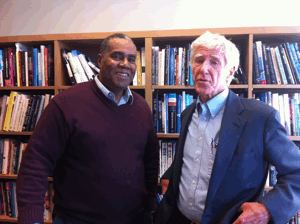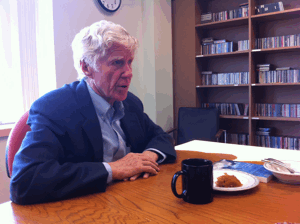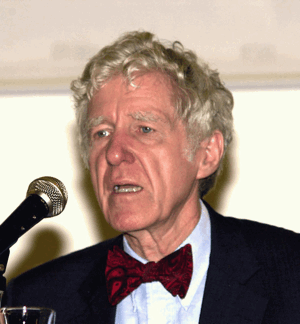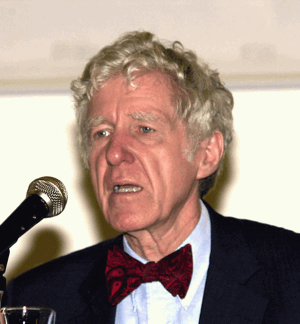How Close are we to the Edge
Air Date: Week of February 18, 2011
Earth Policy Institute president Lester Brown. (Wikipedia Creative Commons)
As food prices rise, and civil unrest builds throughout the Middle East, Lester Brown, president of the Earth Policy Institute, wonders if these two could be connected. LOE’s Steve Curwood talks with Brown about how depleting our natural resources could ultimately lead to our demise.
Transcript
GELLERMAN: A recent World Bank study notes that food prices have soared nearly 30 percent just in the past year. Meanwhile, many autocratic regimes in the Middle East that have ruled for decades have suddenly become unstable - as citizens take to the streets, demanding change.
This is not a coincidence says Lester Brown, president of the Earth Policy Institute. He writes that rich nations are adding to the social instability when they buy up land in poor nations to guarantee their own food supply. Lester Brown is a MacArthur Fellow and the author of more than 50 books. His latest is “World on the Edge: How to Prevent Environmental and Economic Collapse.” He spoke with Living On Earth’s Steve Curwood.
CURWOOD: What’s driving the current spike in world food prices? How is this related to rising population, recent crazy weather events? What’s behind all this?
BROWN: On the demand side, we now have three sources of growing demand for grain. One - population growth. The second thing is rising affluence. There are probably close to three billion people in the world today who want to move up the food-chain and consume more grain in terms of livestock products - meat, milk and eggs.
The third thing is - we’re now converting substantial quantities of grain into oil - i.e. ethanol. And what we’re seeing now is that the world’s farmers are having trouble keeping up with the growth and demand. But, on the supply side…climate change. It used to be that if we had a weather event someplace - a monsoon failure in India or drought in the former Soviet Union, or what have you - we knew that if we could get through the next year that things would go back to normal. But there’s no norm to go back to now. The world’s climate is in a constant state of flux.
CURWOOD: You mention climate change. Temperatures are rising around the world. How do crops and other plants react to this?
BROWN: Well, the rule of thumb is that for each one degree Celsius rise in temperature - that’s 1.8 degrees Fahrenheit - we can expect a ten percent decline in grain yields.
CURWOOD: So even the present target that some people talk about - keeping the warming to less than two degrees Centigrade - is going to result in a 20 percent cut in our productivity for food on the planet? In the best case scenario that people talk about…
BROWN: If that comes during the growing season, that’s what we’re looking at.
CURWOOD: What would have happened if we’d had a drought or heat wave like they had in Russia last year?

Living on Earth's Steve Curwood with Lester Brown.
BROWN: It’s a useful question with a disturbing answer, because, if the heat wave that was centered in Moscow had instead been centered in Chicago, and we lost 40 percent of our grain harvest as the Russians did, we would have lost 160 million tons, not 40 million tons.
If that had happened, there would now be chaos on world grain markets. Food prices would have been rising throughout the world. Grain-exporting countries would have restricted exports to keep their food prices down, reducing the exportable supplies. Most likely, the oil-exporting countries would have begun to barter oil for grain to make sure they could get the grain they needed.
And much of the rest of the world, including lower income and developing countries, would have been left scrambling for the remaining crumbs. And that would have led to governments falling and food riots on a scale that we’ve not seen before. Because when people get really desperate, they do desperate things.
CURWOOD: How much do you think food and water issues are playing in the present instabilities in Egypt, and other countries in the Middle East?
BROWN: It’s hard to sort out, you know - unemployment and rising food prices and frustrations of having a totalitarian government. But there’s no question that, of all economic indicators, I think the most politically sensitive is food prices. In Egypt, interestingly, we have a country importing over half of the grain it consumes, and producing the other, smaller half, if you will, with imported water via the Nile River.
The difficulty now is - with all the land grabs, land acquisitions by the Chinese, the Koreans, the Saudis and many other countries - in the countries in the Upper Nile River Basin, like the Sudan and Ethiopia, when they acquire that land, they also acquire water in the upper part of the Nile Basin, which means there will be less water for Egypt to produce food with. So, Egypt is faced with growing insecurity in its food supply, both because of the competition for imports, and also because it’s going to be getting less water coming down the Nile.
CURWOOD: In your book, you mention what you call a ‘water-based food bubble’- can you please explain that?
BROWN: Well, as the demand for food has been increasing throughout the world, many countries have expanded irrigation, even though it meant over-pumping their aquifers. And, if it’s a fossil aquifer, it doesn’t recharge. Then once you’ve depleted it, it’s finished. And that’s what’s happened in Saudi Arabia - that’s why their wheat production has collapsed in the last few years and will disappear entirely in the next few years.
CURWOOD: But there are not a lot of people in Saudi Arabia.

Lester Brown in the Living on Earth conference room.
BROWN: No, but there are a lot of people in India. And in India, most of the aquifers are replenishable aquifers. So if you over-pump there, when you deplete the aquifer, the rate of pumping is necessarily reduced to the rate of recharge. And that’s what countries like India and China are facing.
CURWOOD: What’s the food situation in those two countries, and how might that impact the U.S.?
BROWN: Both countries are vulnerable because of over-pumping. It now looks as though China’s going to be coming into the world market this year for substantial quantities of grain. They will almost certainly come to the United States, because the United States is far-and-away the world’s leading grain exporter. So for American consumers, this is a nightmare scenario - because we are looking at the prospect of 1.4 billion Chinese with rapidly increasing incomes, competing with us for our grain harvest. Driving up our food prices.
Now you can say, ‘Well, if they drive up our food prices too much, we’ll restrict exports.’ But China is our banker. They’re holding 900 billion dollars in U.S. treasury securities. Like it or not, we are going to be sharing our grain harvest with the Chinese, regardless of how much it drives up food prices.
CURWOOD: Care to predict how much more it could cost us?
BROWN: We are somewhat insulated, because if we buy a loaf of bread for two dollars, for example, the cost of the wheat in that bread is maybe ten cents. So the price of wheat doubles, you add another ten percent onto the loaf of bread. But if you live in Northern India or Pakistan, and you buy your wheat in the market, bring it home and then grind it into flour so you can make chapattis - if the price of wheat doubles, you feel it directly. That’s the difference between the developing world and the industrialized world.
CURWOOD: So, if the phone were to ring, Lester Brown, and it’s the White House. They would like to get a briefing on what one might do in the face of the world food situation. What would you tell them? And in particular, how would you define our security?
BROWN: I would first of all say that this current situation, unlike the price surges in the last half of the last century, is not event-driven, it is trend-driven. That doesn’t mean that events like the heat wave in Russia won’t affect it, but it is trend-driven. So, we have to look at those trends and we have to deal with them.
And it includes things like cutting carbon emissions very fast to stabilize climate. It means eradicating poverty and accelerating the shift to smaller families around the world. It means restoring the economy’s natural support systems with forests and soils and aquifers and grasslands and fisheries, and no civilization has ever survived the ongoing destruction of its natural support systems, Mr. President – nor will ours.
What we’re now faced with is a need to re-define security. We have inherited a definition of security from the last century, which was dominated by two World Wars and the Cold War. And so when you mention national security, in the United States, people automatically think military. But, if you were to sit down with a clean slate today, and say, "What are the leading threats to our future?" It is climate change. It is population growth. It is falling water tables. It is rising food prices. It is failing states.
I would say, Mr. President, we not only need to re-define security in a conceptual sense, but also in a fiscal sense. Because what’s needed to eradicate poverty, stabilize population, restore forests and soils and all these things, comes to about two hundred billion dollars of additional expenditures a year. That’s a lot. But - it’s less than a third of the US military budget, and it’s less than a seventh of the global military budget. So, the question is, can civilization as we know it survive these mounting stressors if we don’t get some of the trends generating the stressors turned around.

Earth Policy Institute president Lester Brown. (Wikipedia Creative Commons)
CURWOOD: So, what you’re saying, in essence, is: security isn’t a matter of guns so much anymore, as it is butter.
BROWN: Bread.
CURWOOD: Bread and butter.
BROWN: Bread and butter, yeah. That’s the message, Mr. President.
CURWOOD: I know people ask you this - what can they do on an individual level?
BROWN: That’s the question I get more frequently than any other. And I think people expect me to say, you know, ‘Change your lightbulbs and recycle your newspapers…’ And those things are important, but we now have to change the system. I don’t mean a political revolution - I mean we have to restructure the world economy in a way that will dramatically reduce carbon emissions. It’s going to take a lot of political support.
So, it’s becoming politically active. Pick an issue that’s important to you - if it’s creating a world-class recycling program in your community, or helping to close coal-fired power plants, or joining a population group to stabilize world population. This is where our future is going to be determined.
CURWOOD: Lester Brown’s new book is called, “The World on the Edge: How to Prevent Environmental and Economic Collapse.” Thank you so much.
BROWN: Steve, my pleasure. Thank you for focussing attention on these issues.
GELLERMAN: That’s Lester Brown talking with Living on Earth's Steve Curwood.
Links
Click here to listen to an extended interview with Lester Brown.
Living on Earth wants to hear from you!
Living on Earth
62 Calef Highway, Suite 212
Lee, NH 03861
Telephone: 617-287-4121
E-mail: comments@loe.org
Newsletter [Click here]
Donate to Living on Earth!
Living on Earth is an independent media program and relies entirely on contributions from listeners and institutions supporting public service. Please donate now to preserve an independent environmental voice.
NewsletterLiving on Earth offers a weekly delivery of the show's rundown to your mailbox. Sign up for our newsletter today!
 Sailors For The Sea: Be the change you want to sea.
Sailors For The Sea: Be the change you want to sea.
 The Grantham Foundation for the Protection of the Environment: Committed to protecting and improving the health of the global environment.
The Grantham Foundation for the Protection of the Environment: Committed to protecting and improving the health of the global environment.
 Contribute to Living on Earth and receive, as our gift to you, an archival print of one of Mark Seth Lender's extraordinary wildlife photographs. Follow the link to see Mark's current collection of photographs.
Contribute to Living on Earth and receive, as our gift to you, an archival print of one of Mark Seth Lender's extraordinary wildlife photographs. Follow the link to see Mark's current collection of photographs.
 Buy a signed copy of Mark Seth Lender's book Smeagull the Seagull & support Living on Earth
Buy a signed copy of Mark Seth Lender's book Smeagull the Seagull & support Living on Earth


